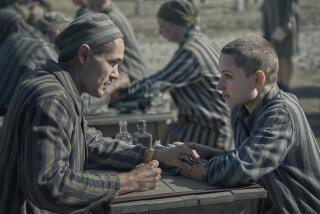Ordinary People, but Extraordinary Acts : THE MAN IN THE BOX by Thomas Moran; Riverhead $21.95, 260 pages
- Share via
In music, a silent beat can count as a note if the composer writes it into the score. In Thomas Moran’s elegant first novel--about villagers in the Austrian Alps who shelter a fugitive Jew during World War II--the effect of the story depends on other stories that the teenage narrator, Niki Lukasser, can’t tell but that Moran expects us to hear.
The biggest of these untold stories is the Holocaust. Dr. Robert Weiss, the Jew who seeks refuge in the remote Austrian village of Sankt Vero in 1943, knows that the Nazis have rounded up members of his family from their home in Innsbruck and locked them into boxcars, but he can only imagine what horrors await them. The people of Sankt Vero know even less--though they have a good idea of what the Gestapo would do to them if they were caught harboring a Jew.
Years before, as a tourist passing through the village on his way to Italy, Weiss performed an emergency appendectomy on Niki and saved his life. This moral debt impels Niki’s father, Martin, to build a camouflaged “box” in his barn, one meter wide, three meters high and four meters long. Darker and more claustrophobic than Anne Frank’s secret annex, it serves the same purpose. Weiss hides there for two years.
Niki and a blind neighbor girl, Sigi Stolz, slip food to Weiss through a concealed flap. He excretes through a hole into the dairy cows’ stalls. As the seasons go by, he stinks, swelters and freezes. For 15 minutes a day, when the youngsters visit, Weiss reminisces about his life as an army surgeon in World War I, a socialite in Vienna, a family man and a philanderer.
Inevitably, the secret leaks out. Big Ignatz, a sawmill owner who partners with Martin Lukasser in smuggling goods over the Italian border; Traudl Mumelter, the pretty young schoolmistress who is Sigi’s idol and victim of village gossip; Gregor Haas, an ex-soldier who lost a leg on the Russian front--they, and possibly others, all come to know about the Jew in the box.
The strain worsens. German troops are posted in Sankt Vero to spot Allied bombers flying over the Alps. Niki’s mother, already depressed by the deaths of her other children, becomes unhinged. His father looks “airy and spare” as if suffering from cancer, Niki thinks, but it’s only “the weight of the world. . . . My mother, the Jew, my dead brothers and sisters, me.” Weiss, at first an avuncular advisor to the children, grows testy, then suicidal.
For Niki, however, “the dread that harrows me is independent of anything I see or know.” In Sankt Vero, the war itself is the untold story that fills all the silences and makes adults--except, sometimes, Weiss--unsympathetic to the pains of growing up that beset Niki, Sigi and their classmates.
The rough comedy of sexual awakening--similar to Stingo’s concern with losing his virginity in William Styron’s “Sophie’s Choice”--dominates “The Man in the Box” to the point where we may find it excessive and frivolous in a Holocaust story. Yet “The Man in the Box” is Niki’s story. Why not tell it from Weiss’ point of view, or Martin Lukasser’s? Because that would emphasize suffering or heroism. Moran, instead, is writing about the enigma of a heroic act performed by the most ordinary of people. He rubs our noses in their ordinariness. They are foolish, petty, prejudiced, jealous. They aren’t sure why they hide the Jew--himself such an ordinary man, though his talk helps the teenagers imagine a wider world.
Killing Weiss or turning him in, thereby relieving the strain, is a constant temptation. “I kept the idea of betrayal pressed closely to me,” Niki admits. “It was a wonderful thing to be feared a little.”
The most ominous silences in Moran’s novel are those in which we hear the echoes of other Holocaust literature. From Jerzy Kosinski and Elie Wiesel through Cynthia Ozick, writers have prepared us to believe in a world where no depth of betrayal or inhumanity is unreachable. We read “The Man in the Box” expecting the worst, and the spare and ambiguous tune Moran plays wouldn’t be the same without the counterpoint of that terrible music.
More to Read
The biggest entertainment stories
Get our big stories about Hollywood, film, television, music, arts, culture and more right in your inbox as soon as they publish.
You may occasionally receive promotional content from the Los Angeles Times.










